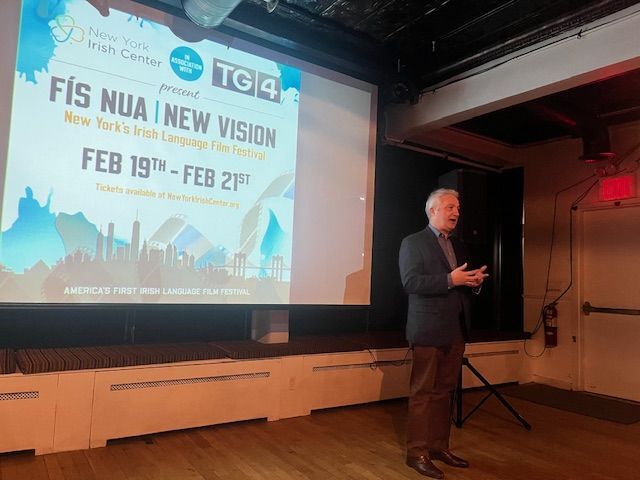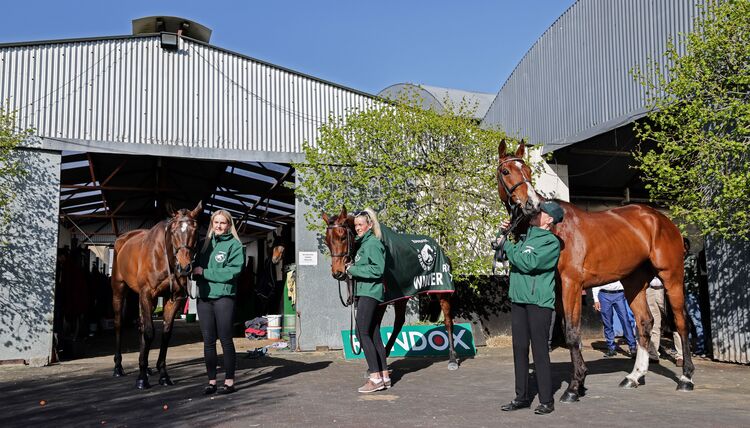Page Turner / Edited by Peter McDermott
Connie Roberts signs a copy of “Little Witness.”
PHOTO: PETER MCDERMOTT
”God knows, there’s enough Irish misery to sink the Titanic in this volume,” said Connie Roberts candidly of her debut book, “but there are also poems of love, forgiveness and acceptance.”
In “Little Witness,” the County Offaly immigrant interrogates “memory and history, mine and others'. From my ferocious early childhood with my parents to my years in an industrial school [orphanage] in the Irish Midlands. From the 1943 Cavan orphanage fire, where 35 children perished, to the self-immolation of Peter Tyrrell, a former inmate of Letterfrack Industrial School, in a London park.”
Roberts and all of her 14 siblings grew up in Irish orphanages. She came to the U.S. in 1983 and today teaches creative writing at Hofstra University. Fans of her work include Irish-American writer and the New York Times’ “Our Land” columnist Dan Barry who has commented: “Roberts honors children, holds adults accountable, and finds acceptance, all with a reportorial rigor that, through her soaring language and big-hearted vision, achieves poetic art. This is the poetry of rock-hard experience. It will skin your soul.”
Among her other admirers are her friends at Artists Without Walls, which officially launched “Little Witness” in Manhattan on July 12. For pictures of that event, see the print edition of this week's Irish Echo, published on Wednesday, the 29th.
Connie Roberts
Date of birth: Dec. 3, 1962.
Place of birth: Tullamore, Co. Offaly.
Spouse: He would rather remain anonymous.
Children: One son, 11-year-old Aedan Hannigan.
Residence: Merrick, N.Y.
Published works: “Little Witness,” a poetry collection, whose earlier versions won the Patrick Kavanagh Award and the Listowel Writers’ Week Poetry Collection Award.
What is your writing routine? Are there ideal conditions?
Because of the subject matter of “Little Witness,” childhood trauma, it took me 15 years to write this book. It was done in fits and starts; although, like many writers, when I wasn’t writing, I was writing. And when I sat down and bellied up to my desk, I was like a dog at the end of a postman’s trousers: I refused to let go. I’d stick with it for hours, days or weeks, till I got the job (poem) done. I wouldn’t recommend this way of working, however: work/life balance is so much better for you.
As for ideal conditions: 10 p.m., a quiet house, a Starbucks Americano, a (warm) chocolate croissant, and the night stretched out before you.
What advice do you have for aspiring writers?
Write about what’s important to you. If you don’t know what that is, take the time to find out. For some, your subject matter will be foisted upon you; others, you’ll have to do some rooting around.
Name three favorite poets:
Seamus Heaney, Paula Meehan, Molly Peacock.
What book are you currently reading?
I recently finished Belinda McKeon’s novel “Tender” and two Irish poetry collections: Breda Wall Ryan’s “In a Hare’s Eye” and Jane Clarke’s “The River.” I am now reading the anthology “Poetry of Witness”, edited by Carolyn Forche and Duncan Wu (for a poetry of witness course I’m developing at Hofstra). Anne Enright’s “The Green Road” is waiting patiently on my nightstand.
Is there a poem you wish you had written?
Gjertrud Schnackenberg’s “Kremlin of Smoke,” her fictionalized sequence of Chopin’s visit to Stuttgart in 1841, when he heard Warsaw had fallen to the Russians.
If you could meet one author, living or dead, who would it be?
I’d like to go for a cuppa or jar with Seamus Heaney. The night before he died, I dreamt of him (I know!)—I was reading an actual poem I had written a year before in response to his “Tollund Man” and he came up on the stage beside me, smiled a mischievous smile and joined in. (Aren’t dreams great? You get to be a superhero, alongside the real superheroes.) Of course, this dream could just speak to my incredible audacity.
What book changed your life?
“Suffer the Little Children: The Inside Story of Ireland’s Industrial Schools,” by Mary Raftery and Eoin O’Sullivan. It wasn’t so much that it changed my life, but awakened me to my life.
What is your favorite spot in Ireland?
Maisie’s farm, Tubber, Co. Westmeath. Maisie’s parents fostered me at weekends for about a year when I was 7. They lived up a long boreen, in a thatched cottage on a farm. No running water. No TV. Sheep, goats, chickens. I see Maisie’s father furrowing fields with a horse. Her mother pouring the golden grease of the lambs chops from the frying pan over the turnips for dinner. Maisie and I climbing to the heavens on the makeshift swing on the tree out back. It’s a place I visit often in my memory.
You're Irish if...
when someone asks you if you’ve been “home” lately, you know exactly what they’re talking about.
For more information, go to connierobertspoet.com.











